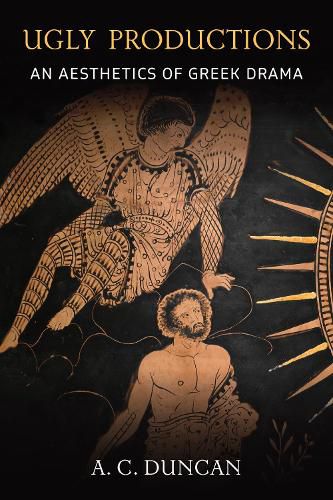Readings Newsletter
Become a Readings Member to make your shopping experience even easier.
Sign in or sign up for free!
You’re not far away from qualifying for FREE standard shipping within Australia
You’ve qualified for FREE standard shipping within Australia
The cart is loading…






Amidst a culture otherwise obsessed with beauty, the Greek theater provided a unique space for Athenians to play with ugliness-to try these anti-ideals on for size. Such imaginative play was considered dangerous by some, such as Plato, who feared its corrupting influence; others, including Aristotle, saw the theater's provocation and release of emotions as educational and even therapeutic. Sophocles' and Euripides' fifth-century audiences could not help but directly confront the ugliness of their drama, but as cultural memory of embodied productions faded, an abstracted contrast emerged between beautiful tragedy and ugly comedy-a pernicious aesthetic polarization that persists to this day. A. C. Duncan's Ugly Productions embraces the materiality of the theater, arguing that dramatic aesthetics are best understood within affective frameworks where beauty or ugliness are produced through a dynamic interplay of verbal and visual modalities. Duncan reframes the Greek concept of "the ugly" not as mere "anti-beauty," but as an affective disposition positively associated with such painful emotions as pity, fear, grief, and abjection.
Through studies of the figures of Xerxes, Electra, Philoctetes, Ajax, Heracles, and other tragic figures, Ugly Productions offers detailed analyses of the various ways ugliness was produced in performance with each chapter serving as an in-depth guide for studying the aesthetics of these works. Duncan confronts the historical neglect of ugliness in critical discourses, calling for a revaluation of negative aesthetics and renewed interest in the uglier aspects of these canonical works of theater.
$9.00 standard shipping within Australia
FREE standard shipping within Australia for orders over $100.00
Express & International shipping calculated at checkout
Amidst a culture otherwise obsessed with beauty, the Greek theater provided a unique space for Athenians to play with ugliness-to try these anti-ideals on for size. Such imaginative play was considered dangerous by some, such as Plato, who feared its corrupting influence; others, including Aristotle, saw the theater's provocation and release of emotions as educational and even therapeutic. Sophocles' and Euripides' fifth-century audiences could not help but directly confront the ugliness of their drama, but as cultural memory of embodied productions faded, an abstracted contrast emerged between beautiful tragedy and ugly comedy-a pernicious aesthetic polarization that persists to this day. A. C. Duncan's Ugly Productions embraces the materiality of the theater, arguing that dramatic aesthetics are best understood within affective frameworks where beauty or ugliness are produced through a dynamic interplay of verbal and visual modalities. Duncan reframes the Greek concept of "the ugly" not as mere "anti-beauty," but as an affective disposition positively associated with such painful emotions as pity, fear, grief, and abjection.
Through studies of the figures of Xerxes, Electra, Philoctetes, Ajax, Heracles, and other tragic figures, Ugly Productions offers detailed analyses of the various ways ugliness was produced in performance with each chapter serving as an in-depth guide for studying the aesthetics of these works. Duncan confronts the historical neglect of ugliness in critical discourses, calling for a revaluation of negative aesthetics and renewed interest in the uglier aspects of these canonical works of theater.